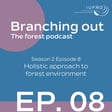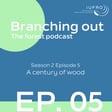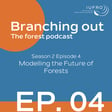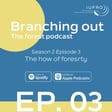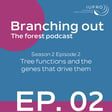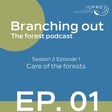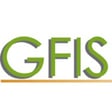Become a Creator today!Start creating today - Share your story with the world!
Start for free
00:00:00
00:00:01

GFEP - (Interview with Alexander Buck) - by the International Union of Forest Research Organizations (IUFRO)
During this podcast, Tarun Bathija interviews Alexander Buck(IUFRO-SPDC Project Coordinator) to get a better understanding of the International Union of Forest Research Organization's - Global Forest Expert Panel Programme, which provides a mechanism for effectively communicating information and scientific expertise to governments and intergovernmental processes related to forests and trees.
Transcript
Introduction to the Youfro Podcast
00:00:11
Speaker
Hello everybody, welcome to the Youfro Podcast. I'm Tarun Batija, reporting from the headquarters of the International Union of Forest Research Organizations in Vienna, Austria.
Discussing the Global Forest Expert Panel
00:00:22
Speaker
In this podcast, I will be interviewing Alexander Boek, who is the coordinator of GFIP, the Global Forest Expert Panel. First of all, I'd like to start by asking you, what is GFIP?
00:00:33
Speaker
Well, GFEB is the acronym for Global Forest Expert Pendles. It's an initiative coordinated by EUFRO. The GFEB brings together scientists from all around the world to carry out scientific assessments on issues of global concern.
Impact of Climate Change on Forests
00:00:49
Speaker
the composition of these panels depends on the issue to be addressed. The first such panel was established last year and they prepared a comprehensive state of knowledge report about how the climate change will impact forest, influence forests and what can be done about that.
Establishment and Purpose of GFEP
00:01:05
Speaker
And why was GFEB established? Well, GFEB was established following the request articulated in many policy forum for better scientific information.
00:01:17
Speaker
From what I have understood, Gfap is an initiative under the umbrella of the CPF. Can you explain to us what is the CPF?
00:01:25
Speaker
The Collaborative Partnership on Forests, or CPF, is a partnership of 14 forest-related international organizations and United Nations agencies with substantive programs on forests. It promotes both the implementation of sustainable forest management on the ground and supports the international policy deliberation, deliberations on forests and related issues worldwide.
Role of GFEP in Policy Making
00:01:49
Speaker
And how does GPAP contribute to better policies?
00:01:53
Speaker
Good policies need good information. And in fact, the effectiveness of policies often suffers from a lack of scientific information, of good information. And that is exactly where GFEB comes into play. But how exactly can GFEB help those policymakers?
00:02:10
Speaker
GIFA provides these policy makers with a comprehensive state of knowledge report on some of the most pressing issues such as climate change and forest biodiversity loss and other issues. And by producing a special summary for policy makers, we try to make sure that this information is actually also being used by policy decision makers. And why is it so important for an organization like UFRO to work at the so-called science policy interface?
00:02:37
Speaker
Well, EUFRO brings together some of the best scientists working on forest issues from around the world.
Influence and Media Coverage of GFEP Reports
00:02:43
Speaker
The knowledge generated within this global EUFRO network addresses some of the most pressing problems of our times and that information generated by these scientists can be used by policy and decision makers in order to address these problems. At the same time, scientists can only do research in an enabling environment and only if the adequate resources are provided by policy makers.
00:03:07
Speaker
And therefore it's important for the scientific community to show the added value and the impact of its research. And this is why you for engages at the Science Policy Interface. And do you believe that GFAB is a good mechanism?
00:03:22
Speaker
Of course, a chief wants to influence policies and wants to contribute to more effective policies. At the same time, that has turned out in the past to be a difficult task. Actually, ideas tend to spread gradually in the minds of policymakers and only influence the debates gradually.
00:03:41
Speaker
Nevertheless, the experiences we have gained so far with GFEB are rather encouraging.
Innovations and Future of Forest Governance
00:03:45
Speaker
For example, the report addressing adaptation of forests to climate change received very significant media coverage around the world. What is so unique about GFEB and why should people really care about it? People should care about GFEB because it's an innovative and potentially very effective mechanism for contributing to better forest policies by means of providing the latest scientific information.
00:04:10
Speaker
This interview was recorded in 2009, and since then, GPEP has already initiated a new scientific assessment. As Alexander already mentioned, the first report produced by GPEP was on the adaptation of forests and people to climate change. The most recent expert panel focuses on forest governance, entitled the Expert Panel on International Forest Regime. This assessment will contribute to different policy-related processes
00:04:38
Speaker
this year and in 2011. And as 2011 is the International Year of Forests, it will hopefully help raise awareness about the role of international institutions and mechanisms affecting forests. More information is available on the UFRO website. Please visit www.ufro.org.
00:05:00
Speaker
This was a podcast brought to you by UFRA, the International Union of Forest Research Organizations. Thank you for listening and stay tuned.

